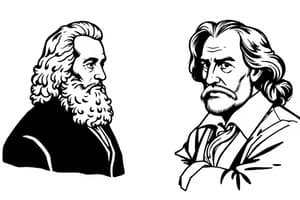Podcast
Questions and Answers
What does Hobbes claim is necessary for the existence of morality?
What does Hobbes claim is necessary for the existence of morality?
- A belief in a higher moral authority
- Mutual respect among people
- A common power to enforce laws (correct)
- Social contracts among individuals
According to Hobbes, what allows individuals to do anything in the state of nature?
According to Hobbes, what allows individuals to do anything in the state of nature?
- The absence of moral laws
- The desire for community
- The right of nature (correct)
- The fear of being attacked
In Hobbes's view, what defines injustice?
In Hobbes's view, what defines injustice?
- The failure to honor social contracts
- Actions taken to survive in a competitive environment
- The breach of laws enforced by a power (correct)
- The decision to invade another’s property
What does Hobbes suggest about the right to defend oneself?
What does Hobbes suggest about the right to defend oneself?
What principal motivations does Hobbes identify for attacks in the state of nature?
What principal motivations does Hobbes identify for attacks in the state of nature?
How does Hobbes categorize the state of nature with respect to moral notions?
How does Hobbes categorize the state of nature with respect to moral notions?
According to Hobbes, why do individuals seek to increase their power?
According to Hobbes, why do individuals seek to increase their power?
What is one implication of Hobbes's idea of the natural right of liberty?
What is one implication of Hobbes's idea of the natural right of liberty?
What happens when two individuals desire the same scarce resource?
What happens when two individuals desire the same scarce resource?
How does a reputation for strength affect an individual in Hobbes' view?
How does a reputation for strength affect an individual in Hobbes' view?
What does Hobbes argue happens in the absence of a common power?
What does Hobbes argue happens in the absence of a common power?
What does Hobbes imply about the nature of human beings in relation to power?
What does Hobbes imply about the nature of human beings in relation to power?
Which of the following best describes Hobbes's position on moral duty in the state of nature?
Which of the following best describes Hobbes's position on moral duty in the state of nature?
What does Hobbes suggest about the security of individuals in the state of nature?
What does Hobbes suggest about the security of individuals in the state of nature?
What rationale does Hobbes provide for why one would attack another in the state of nature?
What rationale does Hobbes provide for why one would attack another in the state of nature?
What is Hobbes' perspective on the concept of fame in relation to power?
What is Hobbes' perspective on the concept of fame in relation to power?
What does Hobbes state is the first fundamental law in the state of nature?
What does Hobbes state is the first fundamental law in the state of nature?
How does Hobbes suggest people should approach their rights to possessions in relation to others?
How does Hobbes suggest people should approach their rights to possessions in relation to others?
What is the negative formulation of the 'golden rule' presented by Hobbes?
What is the negative formulation of the 'golden rule' presented by Hobbes?
What does Hobbes believe about the nature of the Laws of Nature?
What does Hobbes believe about the nature of the Laws of Nature?
What challenge does Hobbes face regarding individual and collective rationality?
What challenge does Hobbes face regarding individual and collective rationality?
How many Laws of Nature does Hobbes enumerate in total?
How many Laws of Nature does Hobbes enumerate in total?
Why does Hobbes believe few people can deduce the Laws of Nature?
Why does Hobbes believe few people can deduce the Laws of Nature?
What does Hobbes ultimately propose regarding the nature of moral laws?
What does Hobbes ultimately propose regarding the nature of moral laws?
What motivates 'savage man' according to Rousseau?
What motivates 'savage man' according to Rousseau?
How does Rousseau view human progress?
How does Rousseau view human progress?
What does Rousseau claim about the state of nature compared to civilized society?
What does Rousseau claim about the state of nature compared to civilized society?
Which of the following best describes Rousseau's impulse to avoid harming others?
Which of the following best describes Rousseau's impulse to avoid harming others?
What primary conflict does Rousseau identify in the drives of 'savage man'?
What primary conflict does Rousseau identify in the drives of 'savage man'?
How does Rousseau perceive the development of the arts and sciences?
How does Rousseau perceive the development of the arts and sciences?
What would likely happen to the influence of compassion if resources are scarce, according to Rousseau?
What would likely happen to the influence of compassion if resources are scarce, according to Rousseau?
What is Rousseau's attitude towards a return to the state of nature?
What is Rousseau's attitude towards a return to the state of nature?
What is the main reason John Stuart Mill gives for justifying the state?
What is the main reason John Stuart Mill gives for justifying the state?
According to Locke, under what condition can one come under another person's authority?
According to Locke, under what condition can one come under another person's authority?
What is Locke's view on the natural state of human beings?
What is Locke's view on the natural state of human beings?
What does Mill suggest is necessary for a positive justification of the state?
What does Mill suggest is necessary for a positive justification of the state?
What did the fall of the former eastern bloc countries illustrate according to the discussion?
What did the fall of the former eastern bloc countries illustrate according to the discussion?
What is perceived as a significant problem for the justification of the state?
What is perceived as a significant problem for the justification of the state?
What does Mill consider to be wishful thinking regarding enforceable restraints?
What does Mill consider to be wishful thinking regarding enforceable restraints?
How does Locke reconcile individual autonomy with the authority of the state?
How does Locke reconcile individual autonomy with the authority of the state?
Flashcards are hidden until you start studying
Study Notes
Hobbes' View on the State of Nature
- Individuals desiring the same resources that cannot be shared become enemies, leading to conflict aimed at self-preservation.
- Even with equal power, the desire for land and resources motivates others to mobilize forces to dispossess individuals of their gains and liberties.
- People seek not just immediate satisfaction but also power to secure future desires; reputation for strength can prevent attacks.
- Three main motives for aggression in the state of nature include: gain (resources), safety (preventive action against others), and glory (establishing reputation).
- Human beings, in seeking happiness, constantly strive to increase their power to access future goods.
The Liberty in the State of Nature
- In the absence of a common power, Hobbes asserts there are no moral laws, leading to a lack of right or wrong.
- The concept of justice does not apply without a lawgiver; therefore, individuals have complete liberty to do as they see fit for self-preservation, including taking lives.
- Hobbes argues that individuals are justified in their actions when defending themselves from perceived threats.
- The 'Natural Right of Liberty' allows individuals to act based on their judgment in the state of nature.
Laws of Nature
- Hobbes introduces the 'Laws of Nature', fundamental principles to govern conduct even in a state without formal laws.
- The first law promotes the pursuit of peace; when peace cannot be achieved, individuals may resort to war.
- A second law encourages mutual agreement on rights; individuals should seek equal liberty in society.
- The third law emphasizes the importance of keeping covenants and agreements.
- Hobbes proposes a total of nineteen Laws of Nature, derived from rational conclusions rather than moral laws.
Tension Between Peace and War
- Hobbes suggests rational behavior can result in both war and the pursuit of peace, leading to a duality within human nature.
- This contradiction arises from how individual self-preservation often leads to conflict when resources are scarce.
Rousseau's Counterargument
- Rousseau argues that human beings possess innate compassion, which contrasts Hobbes' view of the state of nature as inherently conflictual.
- He asserts that despite the lack of formal moral laws in the state of nature, individuals tend to avoid harming others because of their natural aversion to suffering.
- The tension arises when the need for self-preservation conflicts with compassion.
Justification of the State
- The state is seen as a necessary mechanism to avoid the intolerability of life in the state of nature.
- John Stuart Mill contends that life without limits imposed by a governing authority lacks worth, prompting acceptance of the state.
- Critics of the state, particularly Locke, argue that the state’s authority must be justified through consent, highlighting the natural rights of individuals to freedom and equality.
- Locke's perspective presents a challenge for justifying state authority as it must be consistent with the autonomy of individuals.
Studying That Suits You
Use AI to generate personalized quizzes and flashcards to suit your learning preferences.




